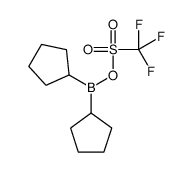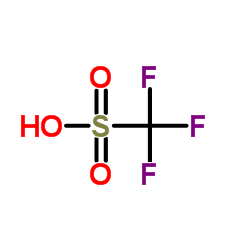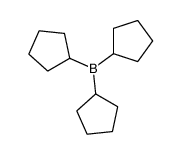72251-50-4
| Name | dicyclopentylboranyl trifluoromethanesulfonate |
|---|---|
| Synonyms |
DICYCLOPENTYLBORYL TRIFLUOROMETHANESULFONATE
Dicyclopentylbor-triflat Bor-dicyclopentyl-trifluormethylsulfonat dicyclopentylboryl trifluromethane-sulfonate dicyclopentylborinyl trifluoromethanesulfonate dicyclopentyl boron triflate dicyclopentylboron trifluoromethanesulfonate |
| Molecular Formula | C11H18BF3O3S |
|---|---|
| Molecular Weight | 298.13000 |
| Exact Mass | 298.10200 |
| PSA | 51.75000 |
| LogP | 4.81330 |
|
Version 1.2
Regulation (EC) No 1907/2006 1 - Product and Company Information Product NameDICYCLOPENTYLBORON TRIFLATE, 0.5M SOLUTI ON IN DICHLOROMETHANE 2 - Hazards Identification SPECIAL INDICATION OF HAZARDS TO HUMANS AND THE ENVIRONMENT Highly flammable. Toxic by inhalation, in contact with skin and if swallowed. Causes burns. Limited evidence of a carcinogenic effect. 3 - Composition/Information on Ingredients Product NameCAS #EC noAnnex I Index Number DICYCLOPENTYLBORON TRIFLATE, 0.5M 72251-50-4 NoneNone SOLUTION IN DICHLOROMETHANE FormulaC11H18BF3O3S Molecular Weight 298,1300 AMU 4 - First Aid Measures AFTER INHALATION If inhaled, remove to fresh air. If not breathing give artificial respiration. If breathing is difficult, give oxygen. AFTER EYE CONTACT Assure adequate flushing of the eyes by separating the eyelids with fingers. AFTER INGESTION If swallowed, wash out mouth with water provided person is conscious. Call a physician. 5 - Fire Fighting Measures CONDITIONS OF FLAMMABILITY Reacts with water to liberate flammable and/or explosive gas. ALDRICHwww.molbase.com EXTINGUISHING MEDIA Suitable: Carbon dioxide, dry chemical powder, or appropriate foam. Unsuitable: Do not use water. SPECIAL RISKS Specific Hazard(s): Extremely flammable. Vapor may travel considerable distance to source of ignition and flash back. Emits toxic fumes under fire conditions. Explosion Hazards: Vapor may travel considerable distance to source of ignition and flash back. SPECIAL PROTECTIVE EQUIPMENT FOR FIREFIGHTERS Wear self-contained breathing apparatus and protective clothing to prevent contact with skin and eyes. 6 - Accidental Release Measures PERSONAL PRECAUTION PROCEDURES TO BE FOLLOWED IN CASE OF LEAK OR SPILL Evacuate area. PROCEDURE(S) OF PERSONAL PRECAUTION(S) Wear self-contained breathing apparatus, rubber boots, and heavy rubber gloves. METHODS FOR CLEANING UP Cover with dry lime or soda ash, pick up, keep in a closed container, and hold for waste disposal. Ventilate area and wash spill site after material pickup is complete. 7 - Handling and Storage HANDLING Directions for Safe Handling: Do not breathe vapor. Do not get in eyes, on skin, on clothing. Avoid prolonged or repeated exposure. STORAGE Conditions of Storage: Keep tightly closed. Keep away from heat, sparks, and open flame. Store in a cool dry place. Handle and store under nitrogen. SPECIAL REQUIREMENTS: Air and moisture sensitive. 8 - Exposure Controls / Personal Protection ENGINEERING CONTROLS Safety shower and eye bath. Use only in a chemical fume hood. GENERAL HYGIENE MEASURES Wash thoroughly after handling. Discard contaminated shoes. PERSONAL PROTECTIVE EQUIPMENT Special Protective Measures: Wear appropriate government approved respirator, chemical-resistant gloves, safety goggles, other protective clothing. 9 - Physical and Chemical Properties pH N/A ALDRICHwww.molbase.com BP/BP RangeN/A MP/MP RangeN/A Flash Point- 40,000 °C.Method: closed cup FlammabilityN/A Autoignition TempN/A Oxidizing Properties N/A Explosive Properties N/A Explosion LimitsN/A Vapor PressureN/A SG/Density1,3010 g/cm3 Partition Coefficient N/A ViscosityN/A Vapor DensityN/A Saturated Vapor Conc. N/A Evaporation RateN/A Bulk DensityN/A Decomposition Temp.N/A Solvent ContentN/A Water ContentN/A Surface TensionN/A ConductivityN/A Miscellaneous DataN/A SolubilityN/A 10 - Stability and Reactivity STABILITY Conditions of Instability: Moisture sensitive. Conditions to Avoid: Air sensitive. Materials to Avoid: Strong oxidizing agents, Acids, Alcohols. HAZARDOUS DECOMPOSITION PRODUCTS Hazardous Decomposition Products: Carbon monoxide, Carbon dioxide, Hydrogen chloride gas, Hydrogen fluoride, Boron oxides. 11 - Toxicological Information SIGNS AND SYMPTOMS OF EXPOSURE Symptoms of exposure may include burning sensation, coughing, wheezing, laryngitis, shortness of breath, headache, nausea, and vomiting. Inhalation may result in spasm, inflammation and edema of the larynxand bronchi, chemical pneumonitis, and pulmonary edema. Material is extremely destructive to tissue of the mucous membranes and upper respiratory tract, eyes, and skin. Dichloromethane is metabolized in the body producing carbon monoxide which increases and sustains carboxyhemoglobin levels in the blood, reducing the oxygen-carrying capacity of the blood. ROUTE OF EXPOSURE Multiple Routes: May be fatal if inhaled, swallowed, or absorbed through skin. TARGET ORGAN INFORMATION Nerves. Liver. Pancreas. CONDITIONS AGGRAVATED BY EXPOSURE May cause nervous system disturbances. 12 - Ecological Information ALDRICHwww.molbase.com No data available. 13 - Disposal Considerations SUBSTANCE DISPOSAL Take the material (or its solution) and make a 5% solution in tetrahydrofuran. Cautiously add the solution dropwise to an ice-cooled, stirred basic solution of commercial bleach. Oxidation may release flammable hydrocarbon gases which must be vented. Let stand overnight. Adjust the pH to 7 and destroy excess hypochlorite with sodium bisulfite before disposal of solution. Observe all federal, state, and local environmental regulations. 14 - Transport Information RID/ADR UN#: 2924 Class: 3 PG: II Subrisk: 8 Proper Shipping Name: Flammable liquid, corrosive, n.o.s. IMDG UN#: 2924 Class: 3 PG: II Subrisk: 8 Proper Shipping Name: FLAMMABLE LIQUID, CORROSIVE, N.O.S. Marine Pollutant: No Severe Marine Pollutant: No Technical Name: Required IATA UN#: 2924 Class: 3 PG: II Subrisk: 8 Proper Shipping Name: Flammable liquid, corrosive, n.o.s. Inhalation Packing Group I: No Technical Name: Required 15 - Regulatory Information CLASSIFICATION AND LABELING ACCORDING TO EU DIRECTIVES INDICATION OF DANGER: F-C Highly Flammable. Corrosive. R-PHRASES: 11-23/24/25-34-40 Highly flammable. Toxic by inhalation, in contact with skin and if swallowed. Causes burns. Limited evidence of a carcinogenic effect. S-PHRASES: 16-26-36/37/39-45 Keep away from sources of ignition - no smoking. In case of contact with eyes, rinse immediately with plenty of water and seek medical advice. Wear suitable protective clothing, gloves, and eye/face protection. In case of accident or if you feel unwell, seek medical advice immediately (show the label where possible). ALDRICHwww.molbase.com Caution: Substance not yet fully tested (EU). 16 - Other Information WARRANTY The above information is believed to be correct but does not purport to be all inclusive and shall be used only as a guide. The information in this document is based on the present state of our knowledge and is applicable to the product with regard to appropriate safety precautions. It does not represent any guarantee of the properties of the product. Inc., shall not be held liable for any damage resulting from handling or from contact with the above product. See reverse side of invoice or packing slip for additional terms and conditions of sale. Copyright 2010 Co. License granted to make unlimitedpaper copies for internal use only. DISCLAIMER For R&D use only. Not for drug, household or other uses. ALDRICHwww.molbase.com SECTION 16 - ADDITIONAL INFORMATION N/A |
|
~87% 
72251-50-4 |
| Literature: Evans,D.A.; Nelson,J.V.; Vogel,E. Journal of the American Chemical Society, 1981 , vol. 103, p. 3099 |
| Precursor 2 | |
|---|---|
| DownStream 0 | |

